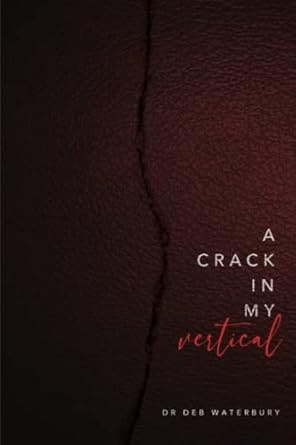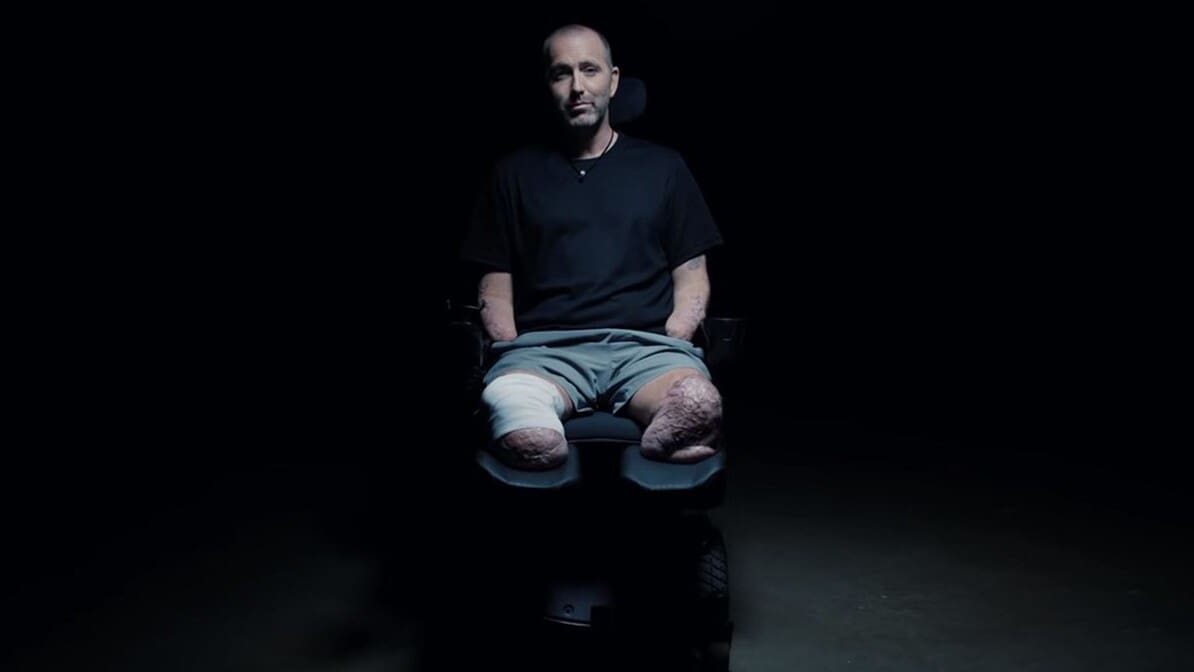
What Are You Up to God?
 Excerpt taken from Chapter 2: “What are you up to God?” of A Crack in My Vertical by Dr. Deb Waterbury.
Excerpt taken from Chapter 2: “What are you up to God?” of A Crack in My Vertical by Dr. Deb Waterbury.
SEEING THE CRACK
It’s not difficult to ascertain what the opposite of peace is. It’s anxiety. It’s worry. It also has a dozen different names currently used by the psychiatric field to describe a condition that is actually the absence of peace.
The dictionary defines peace as “the condition of tranquility or serenity:’ (Dictionary. com) This supposed “condition” seems so elusive in today’s society that we have become a nation of drugs designed to induce this place of peace. We can’t seem to get there on our own, so something synthetic might do the trick.
The truth is that we all want peace. We want peace in our families, friends, nation, and hearts. So, if we all want it so badly, why is it so elusive? Why does peace so easily slip out of our grasp?
At the risk of sounding over-simplistic, attaining true peace in a world almost devoid of it is, once again, not a matter of finding some answer or taking some pill to bring peace into our lives. As with love, finding peace is a matter of perspective. Instead of toiling away at solution after solution to bring about tranquility, we simply need to view our circumstances from a different vantage point.
It’s also calling it what it is. A lack of peace for the believer is actually a lack of trust. It’s the inability to trust that God in all His God-ness is big enough, kind enough, and loving enough to handle any issue we face.
I remember reading about a woman who once approached the famous preacher G. Campbell Morgan after he spoke. She asked, “Do you think we should pray for even the little things in our lives or just the big things?”
In his very dignified British manner, Morgan answered, “Madam, can you think of anything in your life that is big to God?”
This is the perspective we need. This is the truth to which we need to lay hold. God is God. He is above all things and certainly above our trials and troubles. The question is, do you trust that He can do all things? Do you trust that He is good, that He is love, and that He promises you He will take care of you? (Jeremiah 29:11; Romans 8:28)
ADDRESSING THE CRACK
When we feel anxious or worried, we are responding to a lack of control. We have no idea what is about to happen, and because of that, we start worrying. If we don’t understand something, miss something, or simply don’t know what to do, our human propensity will be to worry. That’s control. We want control, and when we have none, we imagine the worst. There is no peace in worry and anxiety, and the ironic thing is that peace is actually what we want. The problem is that we can’t get past our own anxious thoughts long enough to experience it.
My youngest son is a recovering alcoholic. During the dark years of his alcoholism, I literally knew no peace. My heart was in constant turmoil over whether or not he was drinking. When he was, I worried about his health, job, and finances. What had I done wrong? What was going to happen to him? I was quite literally sick with worry pretty much every hour of every day. Truth be told, I didn’t even realize that I had relinquished peace as I searched for some semblance of control over what he was going through. You can see the lie. His issues were never mine to control, but since I couldn’t control them, I gave in to worry.
I began to pray after years of this that God would help me move in these situations in such a way as to bring Him glory. As a minister, I knew I had a responsibility to seek higher answers than the ones I was falling back on. I prayed and prayed, and much like what happened when I asked God to show me how to love, God began to show me Himself.
Once again, I was confused. I was asking God to show me how to find peace, and He kept showing me Himself. I began to read the Bible in a different way, more out of a sense of hopelessness than anything really spiritual. I had to do something. So, I began to read through the Bible, looking for specific character traits of God. I did this each and every day, and then one day, I finally began to see something transforming.
In short, I eventually saw that God doesn’t necessarily do things that I consider loving; God is love. God might not seem to do good things all of the time, but God is good. God doesn’t just keep His promises; God is a promise keeper. My idea of God began to change from what He does to who He is. He is love. He is good. He is a promise keeper. Those things are His character, not simply His actions. He literally embodies love and kindness and goodness and faithfulness.
Taking that a step further, I began to see that if those, things are who God is, not necessarily only what He does, then my paradigm had to shift once again. I had to move out of this temporal perspective and enter into that eternal one, the one where I belonged.
Even though this revelation came about as I worried over my son, it applied to the entirety of my “peace-less” life up until that point. My whole life had been about being valued and feeling worthwhile. When something seemed to contradict this, 1 became anxious and worrisome. My son’s issues with alcohol were just another excuse for me to jump on the “Deb Train of Worry” going nowhere.
However, as God revealed more and more of Himself to me, I started to see where peace actually was. Once again, it was a question of position. I am the bride of the Most High. I am a child of God. I am heir to God’s glory. “And since we are his children, we are his heirs. In fact, together with Christ, we are heirs of God’s glory” (Romans 8:17, NLT).
Since this is true, then I have every reason to trust Him. I am His beloved child, a child He knew before time (Psalm 139:16). God is completely trustworthy. He never fails us, never leaves us, never stops loving us. If I am to believe that, then I must also trust Him. I must move from the temporal place where anxiety and worry reign to the eternal, where trusting the Lover of my soul resides.
Consequently, I came to a crossroads. I was either going to see God as good, or 1 was not. I was either going to know that God is love, or I was not. I was either going to trust God with my son and my life, or I was not. No middle ground; there had to remain only the ground of position. Was I going to stand in my true identity, or was I going to stand in the lie that I don’t belong there, constantly tossed to and fro by the winds of circumstance.
Eventually, I began to lay hold of truth, and that truth really did set me free. I stopped letting my trust in God be nothing more than semantics. I began to see it as my truth, as it actually is, and to claim this truth as His child.
In essence, God began to say to me, “Deb, trust me. I am good. I am love. I am faithful.
You are mine. Your son is mine. Therefore, trust me as your Father, for my love is good:’
I would love to write at this point that my son’s problems were gone from that moment on, but that would be a lie. The truth is that realizing God is good and therefore worthy of our trust does not preclude the struggles of this present world. However, it does give a perspective of peace, no matter what you face.
Not long after that moment in my office and in the following days of moving toward a deeper knowledge of God’s character, I received a phone call from my son. Without going into the specifics of that horrendous day, we picked him up. As my son sat in the front seat while my husband drove us back to our house, I sat in the back, staring up at the clouds as they passed by. I found myself saying, “God, I don’t know what You’re up to, but I trust You. You are good, so this will be good. It is good, even if it doesn’t feel good. I do trust You:’ And then just peace.
I remember thinking that maybe I had finally lost my mind. Maybe I had turned into a sociopath. Maybe I was dreaming. But none of those maybes were true. What was true was that God’s peace, which surpasses all understanding, had guarded my heart and mind (Philippians 4:7). What was true was that God had finally gotten through my thick skull and loosened that banjo string that bound my heart. It turns out that the banjo string Daddy referred to was actually strung by me. My need to control things and see the future and know what to do was the tension on that string. When I let go, I saw God cradle me in His perfect rest.
Because He is good.
And He can be trusted because He is good.
There are still days when I am not at peace. When those days come, no matter what I think has caused them, I know in actuality that it’s a crack in my vertical that’s to blame. If I truly believe that God is God, then my vertical relationship with Him remains intact. When I lose sight of these great truths, peace evades me. It’s never the circumstances or the people that take my peace. It’s always my perspective. It’s always my vertical.
As you read Tabitha’s story in a few pages, you’ll see that it was Tabitha’s vertical as well. What Tabitha needed, much like I needed, was a different perspective. She needed the eternal perspective that allowed her to begin building a trust in God that she hadn’t known before. It was definitely an uphill climb, but once she saw where she was going, I’m happy to say that she was eager to get there.
Truthfully, none of us resides on that mountaintop of peace, but like Tabitha, we can get there again once we know where it is.
It’s just a matter of perspective.
….
Order your copy of A Crack in My Vertical by Dr. Deb Waterbury.
Trending Now
Sign up today for your Inspiration Today Daily Newsletter
Supercharge your faith and ignite your spirit. Find hope in God’s word. Receive your Inspiration Today newsletter now!
Dr. Deb Waterbury
Dr. Deb Waterbury is founder of The Answer Biblical Counseling Center in Tucson, Arizona as well as the online certification course for ministry leaders, The Academy of Biblical Counseling. She established the Reap What You Sew trade school for impoverished women in Malawi, Africa which was the subject of a multi-award-winning documentary that has aired on five television networks. She has authored fifteen books and Bible studies, including the #1 Amazon best-seller We are Mother Abraham and The Lies that Bind: And the Truth that Sets You Free.” She hosts two weekly shows, “Real Life with Deb Waterbury” and “Get Real with Deb Waterbury.” She acquired her Doctor of Ministry in Biblical Expository Studies from Pillsbury Seminary in St. Louis, Missouri. She currently resides in Tucson, Arizona, with her husband, Jeff who recently retired as a Lt. Colonel in the Air Force National Guard. Learn more at DebWaterbury.com.
Related Articles
January 28, 2026
I Just Knew It Was God: From Searching to Finding Faith
From the outside, Ekaterina’s life looked successful. She had a college degree, a strong career,…
January 26, 2026
How to Overcome Old Wounds with Resilience
How Do You Deal with Old Wounds? Everyone is talking about trauma, but very few are talking about…
November 21, 2025
Thank You … Lord
Gratitude transforms our lives and draws us closer to God. This article explores how practicing…
October 27, 2025
So, Is God Good?
Many people wrestle with the question, is God good, especially when life brings pain and loss.…
Next Steps To Strengthen Your Walk
Inspiration Today Newsletter
Supercharge your faith and ignite your spirit. Find hope in God’s word. Receive your Inspiration Today newsletter now!
Christian Articles
Find articles to strengthen your walk and grow your faith. We have a wide range of topics and authors for you.
Submit A Prayer Request
We are here for you. Simply click on the button below to reach us by form, email or phone. Together we will lift our hearts and voices with you in prayer.





